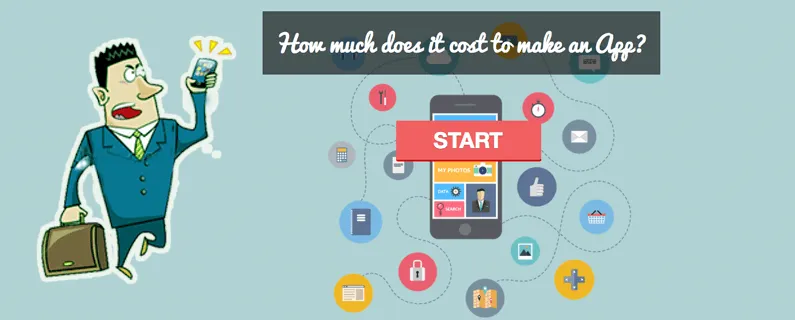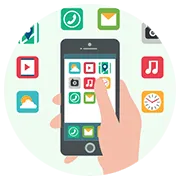
Clients always think first about the expenses they are going to incur in developing an application. Usually low cost and high quality are the parameters people look for, regardless of what nation they belong to. We know this pretty well based on our extensive experience in creating iOS as well as Android mobile applications for not just established companies but even startups throughout the globe.
It is very much obvious that dynamic and complex applications need a good spending in comparison to static and simple apps. Yet, let us attempt to make sense out of what it really takes to build ambitious iPhone, iPad, or Android apps, and are those apps really worth of what you are really paying for.
Factors influencing cost of App Development
Application development expenses are not just related to hourly rates or the development time the whole project takes. The cost relies upon various elements that focuses on effective execution of a thought, and incorporate required intricacies of the product as well and post deployment support as well.
A dedicated app development team
In agreement to the project necessities, a mobile application development team can be fundamental or expanded.
The fundamental group may incorporate a quality assurance expert, at least 2 developers – one front-end & the other back-end, a web designer, a graphic designer, and above all a project manager.
The expanded group may incorporate a fundamental team plus admin panel designer, and separate 2-4 developers for both iOS as well as Android.
Not quite affordable app elements
Clearly, intricacies of a product are the fundamental qualifiers with regards to towering expenses. The following three variables influence the cost of apps development: customized animation & design, device & platform compatibility, and technical complexities.
Technical Complexities
There are many elements identified with specialized intricacies. They include:
3rd Party Extensions
Most features in versatile mobile apps require a mix of 3rd party services, frameworks, and libraries. For instance, to incorporate installment highlights we can install so many services like Braintree or Stripe. Live talks online can be effectively executed with the assistance of Actor, Pubnub, or Layer. Including online networking sharing capacities into an application is impossible without Google+, Twitter, or Facebook APIs, and even other social networks.
Backend Coding
A backend is a working framework that gives API to empower trade of information between an end user of an application and a database. The backend works on application’s business rationale that can run regardless of any input from the user.
Admin Panel Advancement
An admin panel is an exceptionally valuable apparatus that makes it less demanding to work with applications, oversee content and users, view details, and that’s only the tip of the iceberg. To discover a top notch and adaptable administrator panel can be extremely troublesome. Then again, adding getting a personalized design for your business needs may be substantially more productive.
In-app Purchases
From virtual products to extra features there are different types of in-application offers that we can execute. I particularly credit this functionality to be a specialized intricacy component, in light of the extensive variety of errands that can go into the usage of in-application buys.
Apps making use of inbuilt mobile hardware
Modern cell phones are stuffed with diverse equipment segments, for example, whirligig, accelerometer, heart rate sensor, NFC, Bluetooth, GPS, indicator, and others. However, the equipment set may differ as per manufacturer and type of device. Testing how distinctive equipment segments correspond with mobile apps may lead to increased app costs and development time.
Device & OS Compatibility
With regards to an iOS application, it ought to preferably work with the most recent and the past forms of iPhone models (e.g. iPhone 6, 6S, 5C, 5S), and backing the most recent and past iOS variants (e.g. iOS 9 and iOS 8).
Be that as it may, for the Android applications the world looks substantially more diverse. When we choose which gadgets to support, three variables impact our choice:
- Size of overall industry for every Android device producer
- Devices particular for a given business sector
- Client’s inclinations
Clearly, more gadgets will mean additional time spent on adjusting the application for different screen sizes, resolutions, equipment details, and testing. So what we can conclude is an Android application development expense may surpass the expense of building an iOS application.
Customized animation and design
Customized client interface is fairly mind boggling in execution, so efforts required in development would typically cost you more in oppose to the cost of building standard features. You can look at our contextual analysis that discloses three ways to deal with UI outline, and proposes where you can pick custom and standard UI functionalities.
Post deployment costs
An application development spending plan isn’t all about spending on the coding and testing activities. You ought to likewise consider all that costs that goes into marketing the same. Much the same as in any business, an application needs upgrades, client support, backend servers upkeep, cloud facilitating, lawful issues, and also application reach that have a gigantic effect on the app prosperity. In many cases, post deployment expenses are excluded from the estimation for application development, and given as an extra service to create goodwill.
Hourly pay rates for mobile app development across the globe
There are a large number of “best application developers” on this planet, and you may think about how they contrast from each other. When you’re searching for application designers to contract, attempt to pick the individuals who have a skill in the business you need to fit your application in, on the grounds that they most likely have both experience and advantages for completing your venture in the briefest term.
High value measures up to great quality isn’t true always, in light of the fact that there are heaps of variables that impact cost estimation, and among them topography is a standout. Let us see how.
- USA/Canada-based organizations charge somewhere from $50 – $250 every hour
- Australian organizations offer the same in the range of $50 – $150
- West of Europe and UK charge $35 – $170 approximately
- East of Europe lie in the range of $20 – $150
- India $10 – $80 every hour
3 types of apps to calculate costing
The expense of an application is frequently taking into account the quantity of hours that a venture may take, and the more complex the usefulness, the more it takes to execute it. Subsequently, we should partition applications into three classes – simple, medium, and complex. Let us assume the average rate of development cost as $50/hour:
- Simple application normally incorporates some fundamental usefulness, doesn’t require coordinating with any outside APIs, and doesn’t require back-end development. Building up a basic application takes up to 600 hours and begins at approx $30,000.
- Medium application may incorporate custom UI highlights, real time visits, live chat, device adaptation, APIs mix, backend server, and more. It takes around 600-800 hours to get such an app and the value can be estimated at $ 35,000 – 50,000.
- Complex application incorporates multimedia processing, ongoing synchronization, custom activities, reconciliations with 3rd party services, complex backend with database connection, and even others. The time allotment for creating complex applications is 800+ hours, and the value begins at $60,000 – 80,000.
How to wrap up app development estimation?
Before sending you a bill, there is an unpleasant appraisal of the undertaking. That is the way a rough number of hours expected to construct an app as per your documentation/depiction/client stories/detail/whatever you call it.
An evaluation of the undertaking is done where the necessities are recognized for every extent of work arranged, make wireframes to demonstrate how precisely an iOS or Android application will resemble, and get ready with task related documentation.
There is a full-cycle portable application improvement. This implies that an application’s value covers app development stage such as:
Analysis of requirements + Design + Development + Verification based on testing Going by various iterations, the cycle rehashes until an item turns out to be really effective. To dispatch an application is not to finish the mission. It is only the starting. So be prepared for a long haul client relationship.
Rahul Panchal
Rahul Panchal is the Founder & Managing Director at Rlogical Techsoft Pvt. Ltd. He is a pioneer tech enthusiast who has assisted diverse enterprise solutions with a fresh perspective over the years. From integrating technologies like Full-Stack, .NET, Flutter & PHP, he has harnessed custom web or hybrid mobile app development projects. His creative outlook on the latest models of AI, ML, blockchain, and IoT, has made various businesses attain leading-edge success.
Related Blog
- Progressive Web App Development Cost: Accurate Figures Guide
- Top Hybrid App Development Frameworks to Capture 2025 Trends For Your Business
- How Much Does MVP Cost: Factors Influence MVP Development Budget & its Reduction Tips
- Progressive Web App Benefits for Your Business Growth in Future Market
- Flutter for Web App Development: The Cross-Platform Companion For Your Business
Categories
- All
- AI Development Services
- Amazon Web Services (AWS)
- ASP.Net Development
- Azure Web App
- Big Data Analytic
- Customize
- Digital Marketing
- Drupal Development
- E-commerce web development
- Education Mobile App Development
- Enterprise Application
- Event Management App Development
- Fintech
- Fitness App Development
- Food Delievery
- Front-End Development
- Grocery App Development
- Healthcare App Development
- Hire Dedicated Developers
- Hotel Booking App
- IT Industry
- JavaScript Development
- Mobile App Development
- On Demand App Development
- On Demand Healthcare App Development
- PHP Development
- POS Software Development
- Real Estate Mobile App Development
- Retail Business App Development
- Salesforce
- Social Media Development
- Software Development
- Technology
- Transportation App Development
- UI/UX Design
- Web Design
- Web Development
- Web Services
- Web/Data Scraping Services
- WordPress




 Rahul Panchal in Mobile App Development
Rahul Panchal in Mobile App Development 




